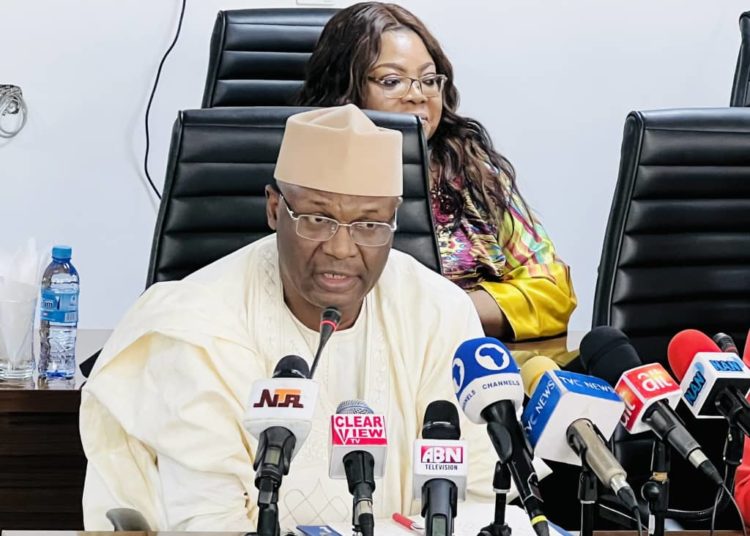The Independent National Electoral Commission (INEC) has said it will monitor political parties’ campaigns and expenses and pay special attention to the observance of limits on party and candidate finance for the 2023 general elections to ensure compliance with the laws.
The Electoral Law mandates candidates and parties to submit to INEC their audited financial reports, capturing revenue inflows and outflows after a general election and at specific periods in the year.
However, three years since the last general elections and 140 days to the 2023 general election, nearly all the political parties that participated in the 2019 general election are yet to submit reports on their expenditures in that election as mandated by the Electoral Act.
Section 88 of the Electoral Act provides that “the maximum election expenses to be incurred by a candidate at a presidential election shall not exceed N5,000,000,000. The maximum amount of election expenses to be incurred by a candidate in respect of governorship election shall not exceed N1,000,000,000” while Section 88 (8) provides that “No individual or other entity shall donate to a candidate more than N50,000,000.”
INEC, via tracking and monitoring, established that the All Progressives Congress (APC) spent N4.6 billion (N4,620,144,784) while the Peoples Democratic Party (PDP) spent N3.3 billion (N3,282,206,642) during the last presidential election. The figures, however, are three times higher than what the law permitted them to spend at the time.
INEC chairman, Professor Mahmood Yakubu, disclosed this yesterday in Lagos at the 6th Annual Conference of the Guild of Corporate Online Publishers (GOCOP) on “2023 Elections: Managing the Process for Credible Outcome.”
The INEC helmsman also urged political parties and candidates to carefully study the provisions of the Electoral Act 2022 and familiarise themselves with their obligations as well as the penalties under the law.
As campaigns commence, he also reminded political parties and candidates of the Peace Accord they signed, which was organised by the National Peace Committee (NPC) in which candidates committed themselves to peaceful campaigns.
He urged the parties to be guided by the letter and spirit of the Accord.
Yakubu said the commission will pay particular attention to the conduct of parties, candidates, and their supporters.
As a regulator, he said the Commission will play its role to ensure compliance with the provision of the law as well as our guidelines and regulations.
“We will pay particular attention to peaceful campaign devoid of abusive, intemperate, and slanderous language as well as the use of innuendoes or insinuations likely to provoke a counter-reaction resulting in the breach of the peace.
“Similarly, we will pay special attention to the observance of limits on party and candidate finance. I urge political parties and candidates to carefully study the provisions of the Electoral Act 2022 and familiarise themselves with their obligations as well as the penalties under the law.
“As you are aware, election is a multi-stakeholder activity. As the Commission is doing its best to ensure a credible process, we also appeal to the media for continuous partnership,” he said
He noted that managing the electoral process for credible outcomes is the responsibility of all stakeholders.
He said as campaign activities get underway, the media will continue to play an important role.
He reiterated that national interest comes first for the Commission, adding that it will not pander to any partisan whims and caprices.
“We pledge to discharge our duties with the highest sense of responsibility and integrity,” he said.
Reiterating the commitment of INEC to credible elections, he said votes will continue to count and will be the sole determinant of electoral outcome.
For this reason, he said the Commission has introduced many new innovations, supported by the deployment of appropriate technology, to protect the sanctity of the choice made by Nigerians at the polls ranging from voter registration to voter accreditation and result management.
He said the deployment of the Bimodal Voter Accreditation System (BVAS) with its dual fingerprint and facial biometric accreditation process has ensured that only genuine voters are accredited to vote during elections.
“This has curtailed the incidence of multiple voting and other sharp practices associated with voter accreditation during elections. The BVAS has come to stay and will be the only means by which voters will be accredited in the 2023 general election,” he said.
Furthermore, he said the introduction of the INEC Result Viewing (IReV) Portal has made the result management procedure more transparent.
“Polling Unit results are now uploaded in real-time to the IReV portal for public view. This has enhanced the transparency, credibility, and consequently public confidence in the outcome of elections.
“The IReV has come to stay and polling unit results will be uploaded to the portal in real-time in the 2023 General Election,” he stated.
We’ve got the edge. Get real-time reports, breaking scoops, and exclusive angles delivered straight to your phone. Don’t settle for stale news. Join LEADERSHIP NEWS on WhatsApp for 24/7 updates →
Join Our WhatsApp Channel










